
Полная версия
Paddington Complete Novels
“What!” cried Paddington. “I didn’t put them in by mistake – I did it on purpose. Besides,” he added, looking most worried at the expression on the lady’s face, “they’re not my jerseys – they’re Mr Curry’s.”
“Well, whoever they belong to,” said the lady, as she hurriedly switched off the machine, “I hope he’s long and thin.”
“Oh dear,” said Paddington, getting more and more worried. “I’m afraid Mr Curry’s rather short.”
“That’s a pity,” said the lady sympathetically, “because he’s got some long, thin jerseys now. You had the machine switched to ‘Hot Wash’ and you should never do that with woollens. There’s a special notice about that.”
Paddington gazed in horror as the lady withdrew a dripping mass of wool from the machine and placed it in his barrow.
“Mr Curry’s jerseys!” he said bitterly to the world in general as he sank back in his chair.
Paddington had been a bit worried about Mr Curry’s jerseys right from the start. After the episode of the kitchen table he hadn’t been very keen on meeting Mr Curry and he’d had to lie in wait until the coast was clear before slipping into his kitchen. He’d found the jerseys in a pile by the sink but there had been nothing to say whether they were meant to be washed or not. Paddington had a nasty feeling in the back of his mind that the answer was ‘not’, and now he was sure of it.
Paddington often found that shocks came in twos and as he sat back in his chair he received his second shock of the morning.
His eyes nearly popped out of his head as one of the other machines containing the Browns’ washing began making a very strange whirring noise. The whirring was followed by several loud clicks and Paddington stared at the machine in amazement as the washing inside began to spin round faster and faster until it suddenly disappeared leaving a gaping hole in the middle.
He jumped up and peered through the porthole at the empty space where, only a few moments before, his washing had been. Then he hurriedly began to undo the knob on the side of the machine. It was all very strange and it definitely needed investigating.
Paddington wasn’t quite sure what happened next, but as he opened the door a stream of hot, soapy water shot out, nearly knocking his hat off, and as he fell over backwards on the floor most of Mrs Bird’s washing seemed to land on top of his head.
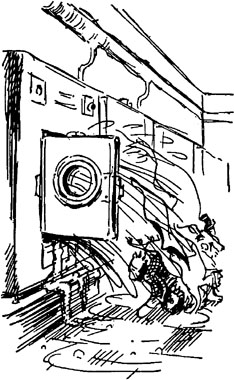
Paddington lay on his back in a pool of water and listened to the shrieks and cries going on all around him. Then he closed his eyes, put his paws in his ears and waited for the worst to happen.
“I think they’ve been having trouble up at the launderette,” said Mrs Bird. “When I came past in the bus just now there was quite a crowd outside and water running out of the door – not to mention bubbles everywhere.”
“The launderette?” said Mrs Brown, looking rather worried.
“That’s right,” said Mrs Bird. “And Mr Curry’s had a burglary. Someone broke into his kitchen in broad daylight and took some jerseys he’d put out for mending.”
Mrs Bird had just arrived back from her holiday and she was exchanging all the news with Mrs Brown. “If I’d known what was going on,” she continued, “I wouldn’t have had a minute’s peace. Jonathan and Judy away and you and Mr Brown ill in bed!” She raised her hands in horror at the thought of it all.
“We’ve been doing very well,” said Mr Brown, as he sat up in bed. “Paddington’s been looking after us.”
“Hmmm,” said Mrs Bird. “That’s as may be.” Mrs Bird had made her way upstairs and she had also found the remains of her feather duster hidden in the hall-stand.
“Have you seen Paddington anywhere?” asked Mrs Brown. “He went out just now but he said he wouldn’t be very long.”
“No,” said Mrs Bird. “And that’s another thing. There are wheelbarrow trails right through the house. All the way up from the shed, through the kitchen and out through the front door.”
“Wheelbarrow trails?” repeated Mr Brown. “But we’ve been in bed for two days.”
“That,” said Mrs Bird sternly, “is exactly what I mean!”
While the Browns were trying to solve the mystery of the wheelbarrow trails Paddington was having an even more difficult time in the launderette.
“But I only opened the door to see where the washing had gone,” he explained. He was sitting on the counter wrapped in a blanket while the mess was being cleared up.
“But it hadn’t gone anywhere,” said the stout lady. “The things only looked as if they had disappeared because they were going round so fast. They always do that.” She sought for words to explain what she meant. “It’s a… it’s a sort of phenomenon.”
“A phen-omen-on?” repeated Paddington. “But it didn’t say anything about a phenomenon in the instructions.”
The lady sighed. Washing machines were rather difficult things to explain and she’d not had many dealings with bears before.
“Bubbles all over my machines!” she exclaimed. “Water all over the floor. I’ve never seen such a mess!”
“Oh dear,” said Paddington sadly. “I’m in trouble again.” He looked at the pile of half-washed clothes next to him. He didn’t know what Mrs Bird would say when she heard all about it, and as for Mr Curry…
“I tell you what,” said the stout lady as she caught sight of the expression on Paddington’s face. “Seeing it’s your first time here and we’re not so very busy, suppose we do it all again. It would never do to have a dissatisfied customer in a launderette.” She gave Paddington a wink. “Then we can put it all in the spin dryer and if I’ve got time I might even be able to iron it for you in the back room. After all, it’s not every day we have a bear’s washing to do.”
Mrs Bird surveyed the neat pile of newly ironed laundry and then turned to Mr and Mrs Brown who had just come downstairs for the first time. “Well,” she said approvingly, “I never expected to see this. I couldn’t have done it better myself.”
“I do hope it’s all right, Mrs Bird,” said Paddington anxiously. “I had a bit of a phenomenon in the launderette.”
“A phenomenon?” repeated Mrs Brown. “But you can’t have a phenomenon in a washing machine.”
“I did,” said Paddington firmly. “And all the water came out.”
“I think you must be mistaken, dear,” said Mrs Brown. “A phenomenon means something strange.”
“And talking of strange things,” said Mrs Bird, looking hard at Paddington, “Mr Curry knocked on the door a moment ago and left you a toffee. He says he’s very pleased with his jerseys. He doesn’t know what you’ve done to them but they fit him for the first time in years. They’ve always been too large up till now.”
“Perhaps,” said Mr Brown, “there was a phenomenon in the washing machine after all.”
Paddington felt very pleased with himself as he made his way upstairs to his room. He was glad it had turned out all right in the end. As he closed the dining-room door he just caught a remark of Mrs Bird’s.
“I think we’re very lucky indeed,” she said. “Looking after a big house like this for two days and doing all the washing into the bargain. That young bear’s one of the old school.”
Paddington puzzled over the remark for some time and in the end he went to consult his friend Mr Gruber on the subject.
When Mr Gruber explained to him that it meant he was very reliable, Paddington felt even more pleased. Compliments from Mrs Bird were very rare.
“But all the better for having when they come, Mr Brown,” said Mr Gruber. “All the better for having when they come.”

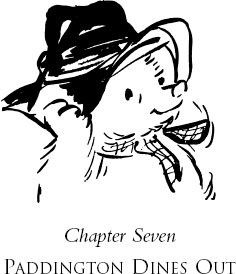
“I vote,” said Mr Brown, “that we celebrate the occasion by visiting a restaurant. All those in favour say ‘aye’.”
Mr Brown’s suggestion had a mixed reception. Jonathan and Judy called out “aye” at once. Mrs Brown looked rather doubtful and Mrs Bird kept her eyes firmly on her knitting.
“Do you think it wise, Henry?” said Mrs Brown. “You know what Paddington’s like when we take him out. Things happen.”
“It is his birthday,” replied Mr Brown.
“And his anniversary,” said Judy. “Sort of.”
The Browns were holding a council of war. It was Paddington’s summer birthday. Being a bear, Paddington had two birthdays every year – one at Christmas and the other in mid-summer. That apart, he had now been with the Browns for a little over a year and it had been decided to celebrate the two occasions at the same time.
“After all, we ought to do something,” said Mr Brown, playing his trump card. “If we hadn’t seen him that day on Paddington station we might never have met him and goodness knows where he would have ended up.”
The Browns were silent for a moment as they considered the awful possibility of never having met Paddington.
“I must say,” remarked Mrs Bird, in a voice which really decided the matter, “the house wouldn’t be the same without him.”
“That settles it,” said Mr Brown. “I’ll ring the Porchester right away and reserve a table for tonight.”
“Oh, Henry,” exclaimed Mrs Brown. “Not the Porchester. That’s such an expensive place.”
Mr Brown waved his hand in the air. “Nothing but the best is good enough for Paddington,” he said generously. “We’ll invite Mr Gruber as well and make a real party of it.
“By the way,” he continued, “where is Paddington? I haven’t seen him for ages.”
“He was peering through the letterbox just now,” said Mrs Bird. “I think he was looking for the postman.”
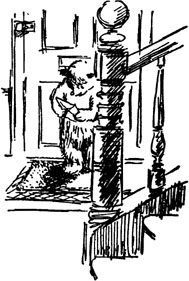
Paddington liked birthdays. He didn’t get many letters – only his catalogues and an occasional postcard from his Aunt Lucy in Peru – but today the mantelpiece in the dining-room was already filled to overflowing with cards and he was looking forward to some more arriving. There had been a card from each of the Browns, one from Mr Gruber, and quite a surprising number from various people who lived in the neighbourhood. There was even an old one from Mr Curry, which Mrs Bird recognised as one Paddington had sent him the year before, but she had wisely decided not to point this out.
Then there were all the parcels. Paddington was very keen on parcels – especially when they were well wrapped up with plenty of paper and string. In fact he had done extremely well for himself, and the news that they were all going out that evening as well came as a great surprise.
“Mind you,” said Mrs Brown, “you’ll have to have a bath first.”
“A bath!” exclaimed Paddington. “On my birthday?”
Paddington looked most upset at the thought of having a bath on his birthday.
“The Porchester is a very famous restaurant,” explained Mrs Brown. “Only the best people go there.”
And, despite his protests, he was sent upstairs that afternoon with a bath cube and some soap and strict instructions not to come down again until he was clean.
Excitement in the Browns’ house mounted during the afternoon and by the time Mr Gruber arrived, looking self-conscious in an evening-dress suit which he hadn’t worn for many years, it had reached fever pitch.
“I don’t think I’ve ever been to the Porchester before, Mr Brown,” he whispered to Paddington in the hall. “So that makes two of us. It’ll be a nice change from cocoa and buns.”
Paddington became more and more excited on the journey to the restaurant. He always enjoyed seeing the lights of London and even though it was summer quite a few of them had already come on by the time they got there.
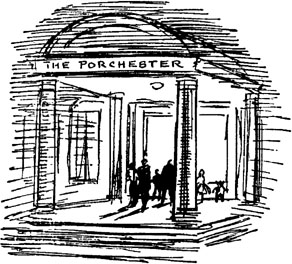
He followed Mr Brown up the steps of the restaurant and in through some large doors, giving the man who held them open a friendly wave of his paw.
In the distance there was the sound of music and as they all gathered inside the entrance in order to leave their coats at the cloakroom, Paddington looked around with interest at the chandeliers hanging from the ceiling and at the dozens of waiters gliding to and fro.
Here comes the head waiter,” said Mr Brown, as a tall, superior-looking man approached. “We’ve booked a table near the orchestra,” he called. “In the name of Brown.”
The head waiter stared at Paddington. “Is the young… er… bear gentleman with you?” he asked, looking down his nose.
“With us?” said Mr Brown. “We’re with him. It’s his party.”
“Oh,” said the man disapprovingly. “Then I’m afraid you can’t come in.”
“What!” exclaimed Paddington amid a chorus of dismay. “But I went without a second helping at lunch specially.”
“I’m afraid the young gentleman isn’t wearing evening dress,” explained the man. “Everyone at the Porchester has to wear evening dress.”
Paddington could hardly believe his ears and he gave the man a hard stare.
“Bears don’t have evening dress,” said Judy, squeezing his paw. “They have evening fur – and Paddington’s has been washed specially.”
The head waiter looked at Paddington doubtfully. Paddington had a very persistent stare when he liked, and some of the special ones his Aunt Lucy had taught him were very powerful indeed. He coughed. “I daresay,” he said, “we might make an exception – just this once.”
He turned and led the way through the crowded restaurant, past tables covered with snowy white cloths and gleaming silver, towards a big round table near the orchestra. Paddington followed on close behind and by the time they reached it the man’s neck had gone a funny shade of red.
When they were all seated the head waiter gave them each a huge card on which was printed a list of all the dishes. Paddington had to hold his with both paws and he stared at it in amazement.
“Well, Paddington,” said Mr Brown. “What would you like to start with? Soup? Hors d’æuvre?”
Paddington looked at his menu in disgust. He didn’t think much of it at all. “I don’t know what I would like, Mr Brown,” he said. “My programme’s full of mistakes and I can’t read it.”
“Mistakes!” The head waiter raised one eyebrow to its full height and looked at Paddington severely. “There is never a mistake on a Porchester menu.”
“Those aren’t mistakes, Paddington,” whispered Judy, as she looked over his shoulder. “It’s French.”
“French!” exclaimed Paddington. “Fancy printing a menu in French!”
Mr Brown hastily scanned his own card. “Er… have you anything suitable for a young bear’s treat?” he asked.
“A young bear’s treat?” repeated the head waiter haughtily. “We pride ourselves that there is nothing one cannot obtain at the Porchester.”
“In that case,” said Paddington, looking most relieved, “I think I’ll have a marmalade sandwich.”
Looking around, Paddington decided a place as important as the Porchester must serve very good marmalade sandwiches, and he was anxious to test one.
“I beg your pardon, sir?” exclaimed the waiter. “Did you say a marmalade sandwich?”
“Yes, please,” said Paddington. “With custard.”
“For dinner?” said the man.
“Yes,” said Paddington firmly. “I’m very fond of marmalade and you said there was nothing you don’t have.”
The man swallowed hard. In all his years at the Porchester he’d never been asked for a marmalade sandwich before, particularly by a bear. He beckoned to another waiter standing nearby. “A marmalade sandwich for the young bear gentleman,” he said. “With custard.”
“A marmalade sandwich for the young bear gentleman – with custard,” repeated the second waiter. He disappeared through a door leading to the kitchens as if in a dream and the Browns heard the order repeated several more times before it closed. They looked around uneasily while they gave another waiter their own orders.
There seemed to be some sort of commotion going on in the kitchen. Several times they heard raised voices and once the door opened and a man in a chef’s hat appeared round the corner and stared in their direction.
“Perhaps, sir,” said yet another waiter, as he wheeled a huge trolley laden with dishes towards the table, “you would care for some hors d’æuvre while you wait?”
“That’s a sort of salad,” Mr Brown explained to Paddington.
Paddington licked his whiskers. “It looks a very good bargain,” he said, staring at all the dishes. “I think perhaps I will.”
“Oh dear,” said Mrs Brown, as Paddington began helping himself. “You’re not supposed to eat it from the trolley, Paddington.”
Paddington looked most disappointed as he watched the waiter serve the hors d’æuvre. It wasn’t really quite such good value as he’d thought. But by the time the man had finished piling his plate with vegetables and pickles, salad, and a pile of interesting-looking little silver onions he began to change his mind again. Perhaps, he decided, he couldn’t have managed the whole trolleyful after all.
While Mr Brown gave the rest of the orders – soup for the others followed by fish and a special omelette for Mr Gruber – Paddington sat back and prepared to enjoy himself.
“Would you like anything to drink, Paddington?” asked Mr Brown.
“No, thank you, Mr Brown,” said Paddington. “I have a bowl of water.”
“I don’t think that’s drinking water, Mr Brown,” said Mr Gruber tactfully. “That’s to dip your paws in when they get sticky. That’s what’s known as a paw bowl.”
“A paw bowl?” exclaimed Paddington. “But I had a bath this afternoon.”
“Never mind,” said Mr Brown hastily. “I’ll send for the lemonade waiter – then you can have an orange squash or something.”
Paddington was getting more and more confused. It was all most complicated and he’d never seen so many waiters before. He decided to concentrate on eating for a bit.
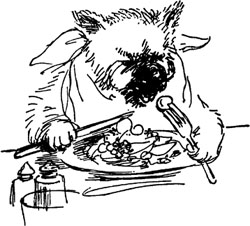
“Most enjoyable,” said Mr Gruber a few minutes later when he had finished his soup. “I shall look forward to my omelette now.” He looked across the table at Paddington. “Are you enjoying your hors d’æuvre, Mr Brown?”
“It’s very nice, Mr Gruber,” said Paddington, staring down at his plate with a puzzled expression on his face. “But I think I’ve lost one of my onions.”
“You’ve what?” asked Mr Brown. It was difficult to hear what Paddington was saying for the noise the orchestra was making. It had been playing quite sweetly up until a moment ago but suddenly it had started making a dreadful row. It was something to do with one of the saxophone players in the front row. He kept shaking his instrument and then trying to blow it, and all the while the conductor was glaring at him.
“My onion!” exclaimed Paddington. “I had six just now and when I put my fork on one of them it suddenly disappeared. Now I’ve only got five.”
Mrs Brown began to look more and more embarrassed as Paddington got down off his seat and began peering under the tables. “I do hope he finds it soon,” she said. Everyone in the restaurant seemed to be looking in their direction and if they weren’t actually pointing she knew they were talking about them.
“Gosh!” exclaimed Jonathan suddenly. He pointed towards the orchestra. “There’s Paddington’s onion!”
The Browns turned and looked at the orchestra. The saxophone player seemed to be having an argument with the conductor.
“How can I be expected to play properly,” he said bitterly, “when I’ve got an onion in my instrument? And I’ve a good idea where it came from too!”
The conductor followed his gaze towards the Browns, who hurriedly looked the other way.
“For heaven’s sake don’t tell Paddington,” said Mrs Brown. “He’ll only want it back.”
“Never mind,” said Mr Gruber, as the door leading to the kitchen opened. “I think my omelette’s just coming.”
The Browns watched as a waiter entered bearing a silver dish which he placed on a small spirit stove near their table. Mr Gruber had ordered an omelette flambée, which meant it was set on fire just before it was served. “I don’t know when I had one of those last,” he said. “I’m looking forward to it.”
“I must say it looks very nice,” said Mr Brown, twirling his moustache thoughtfully. “I rather wish I’d ordered one myself now.
“Come along, Paddington,” he called, as the waiter set light to the pan. “Come and see Mr Gruber’s omelette. It’s on fire.”
“What!” cried Paddington, poking his head out from beneath the table. “Mr Gruber’s omelette’s on fire?”
He stared in astonishment at the waiter as he bore the silver tray with its flaming omelette towards the table.
“It’s all right, Mr Gruber,” he called, waving his paws in the air. “I’m coming!”
Before the Browns could stop him, Paddington had grabbed his paw bowl and had thrown the contents over the tray. There was a loud hissing noise and before the astonished gaze of the waiter Mr Gruber’s omelette slowly collapsed into a soggy mess in the bottom of the dish.
Several people near the Browns applauded. “What an unusual idea,” said one of them. “Having the cabaret act sit at one of the tables just like anyone else.”
One old gentleman in particular who was sitting by himself at the next table laughed no end. He had been watching Paddington intently for some time and now he began slapping his knee at each new happening.
“Crikey!” said Jonathan. “We’re for it now.” He pointed towards a party of very important-looking people, led by the head waiter, who were approaching the Browns’ table.
They stopped a few feet away and the head waiter pointed at Paddington. “That’s the one,” he said. “The one with the whiskers!”
The most important-looking man stepped forward. “I’m the manager,” he announced. “And I’m afraid I must ask you to leave. Throwing water over a waiter. Putting onions in a saxophone. Ordering marmalade sandwiches. You’ll get the Porchester a bad name.”
Mr and Mrs Brown exchanged glances. “I’ve never heard of such a thing,” said Mrs Bird. “If that bear goes we all go.”
“Hear! Hear!” echoed Mr Gruber.
“And if you go I shall go too,” came a loud voice from the next table.
Everyone looked round as the old gentleman who had been watching the proceedings rose and waved a finger at the manager. “May I ask why this young bear’s being asked to leave?” he boomed.
The manager began to look even more worried, for the old gentleman was one of his best customers and he didn’t want to offend him. “It annoys the other diners,” he said.
“Nonsense!” boomed the old gentleman. “I’m one of the other diners and I’m not annoyed. Best thing that’s happened in years. Don’t know when I’ve enjoyed myself so much.” He looked down at Paddington. “I should like to shake you by the paw, bear. It’s about time this place was livened up a bit.”
“Thank you very much,” said Paddington, holding out his paw. He was a bit overawed by the old gentleman and he wasn’t at all sure what it was all about anyway.
The old gentleman waved the waiters and the manager to one side and then turned to Mr Brown. “I’d better introduce myself,” he said. “I’m Sir Huntley Martin, the marmalade king.
“I’ve been in marmalade for fifty years,” he boomed, “and been comin’ here for thirty. Never heard anyone ask for a marmalade sandwich before. Does me old heart good.”
Paddington looked most impressed. “Fancy being in marmalade for fifty years!” he exclaimed.
“I hope you’ll allow me to join you,” said Sir Huntley. “I’ve done a good many things in my life but I don’t think I’ve ever been to a bear’s birthday party before.”
The old gentleman’s presence seemed to have a magical effect on the manager of the Porchester, for he had a hurried conference with the head waiter and in no time at all a procession started from the kitchen headed by a waiter bearing a silver tray on which was another omelette for Mr Gruber.









